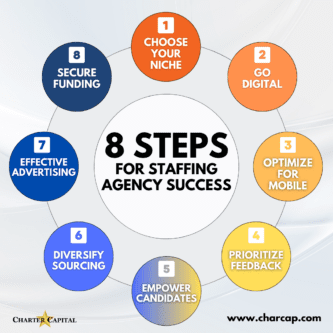Overhead is one of the most critical cost centers in staffing and is also one of the least understood. If you’re running a staffing company, you already know how cash-intensive it is to operate. You’re paying talent before your client cuts you a check. However, what often gets overlooked is how much of your financial pressure comes from overhead itself.
These costs impact your ability to grow, keep payroll current, and stay competitive in a margin-sensitive field. If your overhead is bloated or poorly timed, it puts strain on cash flow, even if your revenue is growing. Understanding what goes into overhead and how much of it you can control is key to staying financially agile.
 What Counts Toward Staffing Company Overhead
What Counts Toward Staffing Company Overhead
In the staffing industry, overhead goes well beyond rent and office supplies. You’re managing two customer groups: the businesses that hire your services and the talent you place. That creates a layered structure, which translates to higher overhead than many other service industries.
When calculating overhead, you need to consider:
- Internal Staff Salaries: This category includes the recruiters, account managers, admin teams, and executives who support your operation.
- Employee Benefits and Insurance: Health insurance, unemployment insurance, workers’ compensation, and any perks tied to full-time staff all add to overhead.
- Technology and Software: Applicant tracking systems (ATS), payroll tools, customer relationship management (CRM) tools, and scheduling systems also fall into this category.
- Office Space and Utilities: Your physical workspace, internet, phone services, utilities, and even janitorial services are a major component of overhead.
- Compliance and Licensing: Although often overlooked, costs for staying compliant with labor laws, renewing agency licenses, and managing legal risk must also be accounted for.
- Marketing and Business Development: This category includes everything from website maintenance to job ads, client outreach, and brand awareness efforts.
- Training and Onboarding: Lastly, include costs related to upskilling internal staff and preparing new hires to meet client expectations.
Fixed vs. Variable Overhead Costs in Staffing
Once you understand what goes into overhead, the next step is recognizing which expenses stay consistent and which ones shift with your workload. This can improve the accuracy of your financial planning, especially when demand surges or dips.
Fixed Overhead Costs in Staffing
Your fixed overhead costs remain relatively stable month to month. They include things like office leases, salaried staff, software subscriptions, insurance, and licensing fees.
Variable Overhead Costs in Staffing
Your variable overhead costs rise and fall with your placement volume and client activity. Examples include payroll for placed talent, job ad spend, background checks, client travel, and internal training.
Average Overhead Costs for Staffing Firms
Overhead costs in staffing are a matter of some debate. On the lower end, average staffing overhead costs are reported at 13 percent of revenue, according to OnContracting. Meanwhile, the American Staffing Association (ASA) places legally mandated labor costs at 14.24 percent alone, and notes that general administrative expenses drain a further 18.7 percent from revenue, placing total overhead at nearly 33 percent.
This means if your staffing firm’s bill rate is $25.76, and your hourly talent pay rate is $17, you’re bringing in just 85 cents in net profit per hour, which works out to a net profit rate of 3.3 percent.
In other words, typical margins don’t leave you with much wiggle room or capital to invest in growth. Managing overhead costs is essential to keeping your business afloat and moving in the right direction.
Top 5 Tips for Managing Staffing Company Overhead
We’ve covered strategies for managing business overhead costs before, and most of those tactics apply here as well. However, there are unique paths to reducing overhead costs and ways to boost operational efficiency that staffing firms can apply, too.
1. Audit Internal Headcount Regularly and Minimize Internal Churn to Stabilize Overhead
It’s common for staffing firms to expand internal teams quickly during periods of growth, but that can lead to inefficiencies. Reevaluate your recruiter-to-placement ratio often and make sure each role is contributing to margin, not just headcount. Addressing this first is key to streamlining staffing operations.
Managing turnover also comes into play here. Turnover among internal staff can lead to more than just hiring costs—it disrupts operations, delays client deliverables, and drives up long-term overhead through repeated onboarding and productivity loss. The focus here is retention: keeping top talent in place to avoid cyclical inefficiencies.
To manage this, prioritize retention strategies such as structured onboarding, career development pathways, and proactive workload management. Leveraging HR analytics can also help spot early signs of burnout or disengagement. The result is a more stable team, reduced administrative strain, and more predictable operating costs, all of which help keep overhead under control.
2. Leverage Tiered Software Plans Strategically
Many staffing platforms and CRMs offer layered pricing. Make sure you’re not locked into an enterprise plan for tools or features your team barely uses. As part of your cost-saving strategies, scale back when needed or renegotiate terms during off-peak seasons.
3. Track Fill-to-Ad-Spend Ratios
Job boards and paid ads are essential, but they can drain your budget fast. As part of your expense management strategies, set internal benchmarks for how many qualified candidates or placements you’re getting per dollar spent, and shift resources to what delivers the best return on investment (ROI).
4. Defer Bonuses or Commissions Until Clients Pay
If your team earns performance-based pay, tie those payouts to when client invoices are collected, not just when placements are made. This keeps cash in the business longer and aligns incentives with healthy cash flow.
5. Use Staffing Factoring to Cover Payroll Gaps
Payroll management is one of the most difficult parts of running a staffing firm. You most likely wait weeks or months after covering payroll before your client pays you. This is not sustainable on three-percent profit margins, particularly for small and medium-sized staffing firms. With staffing factoring, you can get the money you’ve earned right away. The process is simple.
- Get Approved: It’s easy for staffing firms to qualify for factoring because approval is based on the creditworthiness of your clients rather than your history or credit score.
- Receive Payment: Submit your unpaid invoice and receive most of the invoice’s value upfront.
- Move Forward: Your factoring company collects the balance for you, freeing you from chasing invoices. You receive the remaining balance when your client pays the invoice. There’s no debt on your balance sheet and nothing to repay.
You’re not required to factor all your invoices or even start factoring immediately after approval, which means you can tap into funding only as needed and can still count on fast payments when major expenses like payroll don’t align with client payment timelines. Your access to funds also scales with your invoice volume, allowing you to grow your business on your terms.
Work with a Factoring Company That Specializes in Staffing
The margins seen in the staffing industry are tight. It’s a large part of the reason staffing firms struggle to obtain funding and don’t always qualify for the level of funding they need to scale and thrive. But with decades in the industry and tailored services for staffing firms, Charter Capital understands how your business operates and can work with you to develop a funding plan that meets your needs. To take the first step, request a free rate quote.









 America has been undergoing a major revolution in recent years, and this upheaval shows no signs of slowing. Thankfully, this revolution is not a violent rebellion seeking to overthrow the government, but rather a transformation in the way companies hire employees and do business with customers.
America has been undergoing a major revolution in recent years, and this upheaval shows no signs of slowing. Thankfully, this revolution is not a violent rebellion seeking to overthrow the government, but rather a transformation in the way companies hire employees and do business with customers.